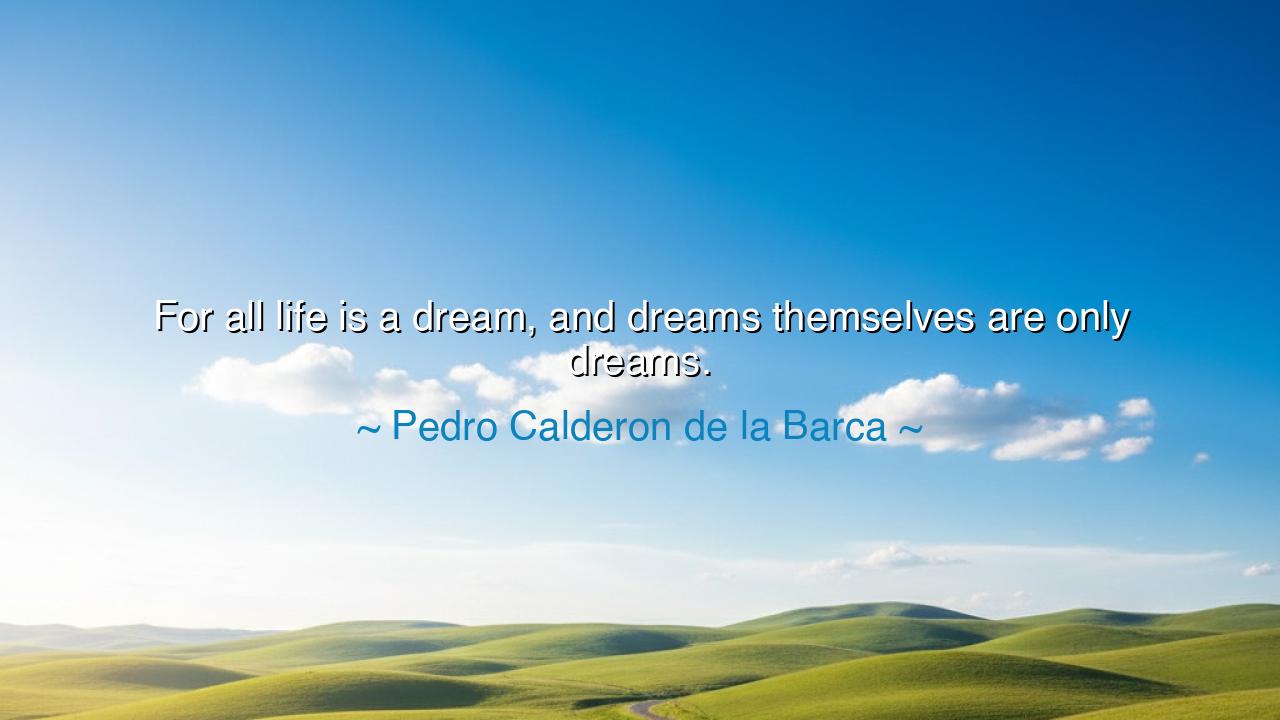
For all life is a dream, and dreams themselves are only dreams.






When Pedro Calderón de la Barca, the great Spanish dramatist of the seventeenth century, wrote, “For all life is a dream, and dreams themselves are only dreams,” he gave voice to one of the most haunting truths of existence. His words emerge from his masterpiece, La vida es sueño (Life Is a Dream), a play that stands among the most profound reflections ever written on reality, illusion, and destiny. In this single line, Calderón distilled the wisdom of the ages—the realization that all we take for certain, all we build and fight for, may be as fleeting and fragile as the visions that vanish with the dawn. Yet in this recognition, there is not despair, but awakening: a call to live consciously, humbly, and wisely within the mystery of life’s dream.
In Calderón’s play, a prince named Segismundo is imprisoned from birth by his father, King Basilio, who fears a prophecy foretelling that his son will bring ruin to the kingdom. When the prince is finally freed, he awakens to the world in confusion and fury. He acts with arrogance and cruelty, believing himself powerful beyond restraint. Yet soon, he is drugged and returned to his prison, told that his brief taste of freedom was nothing but a dream. In his torment, Segismundo comes to a revelation—that life itself may be no more real than the illusions that haunt sleep. It is this awakening that gives rise to Calderón’s immortal line: “For all life is a dream, and dreams themselves are only dreams.” Through Segismundo, Calderón teaches that power, pride, and pain alike are transient—that reality itself is woven from the same impermanent fabric as our night-born visions.
To the ancients, this thought was not foreign. The philosophers of India, speaking through the Upanishads, declared that the world is Maya, an illusion—a veil drawn over the eternal truth of the soul. Likewise, the Greek philosopher Plato wrote of men living in a cave, mistaking shadows for reality. Calderón, steeped in both the mysticism of his Catholic faith and the humanist thought of the Renaissance, merged these traditions into a vision that is both poetic and spiritual. For him, life’s dream is not a denial of meaning, but an invitation to seek the eternal within the ephemeral, to find the divine truth that endures beyond all passing appearances.
There is a modern echo of this wisdom in the story of Emperor Marcus Aurelius, the Stoic ruler of Rome. Though surrounded by power and splendor, he wrote in his Meditations, “All is ephemeral—fame and the famous as well.” He too saw that life, with all its triumphs and tragedies, is but a dream passing through time. Yet this insight did not make him despair. Rather, it gave him clarity and peace. He understood that if life is transient, then what matters most is not the illusion of greatness, but the virtue and wisdom with which one walks through the dream. Thus, like Calderón, he found freedom in the fleeting nature of existence.
When Calderón speaks of life as a dream, he also speaks of its beauty. For what is a dream, if not a world of infinite possibility? Within its shifting light, love and sorrow, failure and grace, all take on meaning because they do not last. The dream of life is sacred precisely because it is temporary. It is the artist’s brushstroke, the lover’s embrace, the child’s laughter—all moments destined to fade, yet more precious for their fragility. To recognize life as a dream is to awaken not to despair, but to reverence—to see that every breath, every face, every fleeting joy is part of a greater mystery beyond our grasp.
This teaching calls us to live differently—to walk through the world not as owners, but as travelers passing through a sacred landscape. If all life is a dream, then let it be a good one. Let us act with compassion, for the pain we cause another will echo in our own sleep. Let us create beauty, for the dream is short and must be filled with light. Let us forgive quickly, love deeply, and hold nothing too tightly. For the dream ends, and what remains is the soul—the witness of all we have dreamed and done.
So let Calderón’s words be a torch for all generations: life is a dream, and its illusions are delicate as smoke. But within this dream lies the opportunity to awaken—to see through the shifting veil and glimpse the eternal. Do not cling to the shadows, nor fear their passing. Instead, move through life with wonder, as one who walks through a dream aware of dreaming—loving all things, yet attached to none. For when the dawn comes, and we awaken from the dream of this world, only those who have lived with awareness will greet the light with peace. And in that awakening, we shall find that though life was a dream, the love we gave within it was real beyond all dreams.






AAdministratorAdministrator
Welcome, honored guests. Please leave a comment, we will respond soon